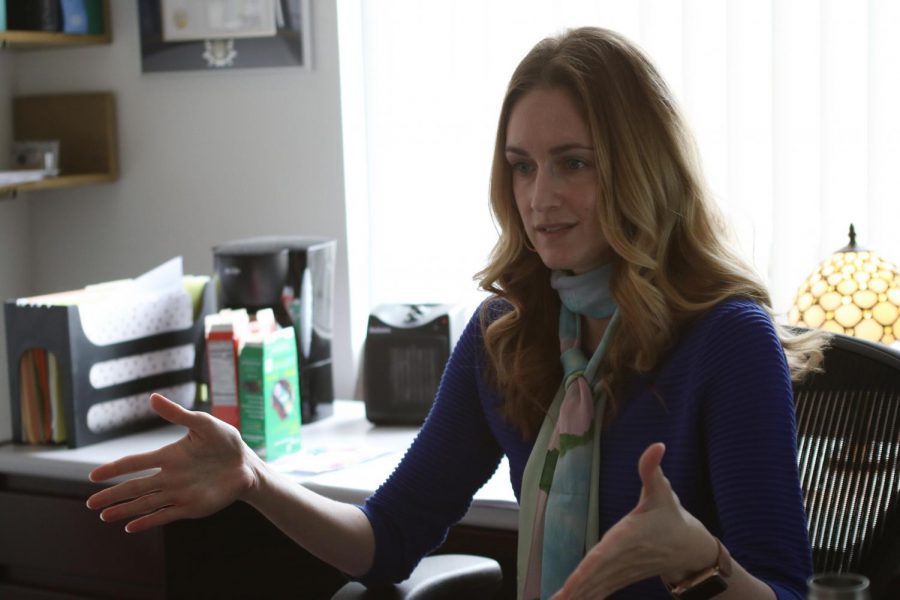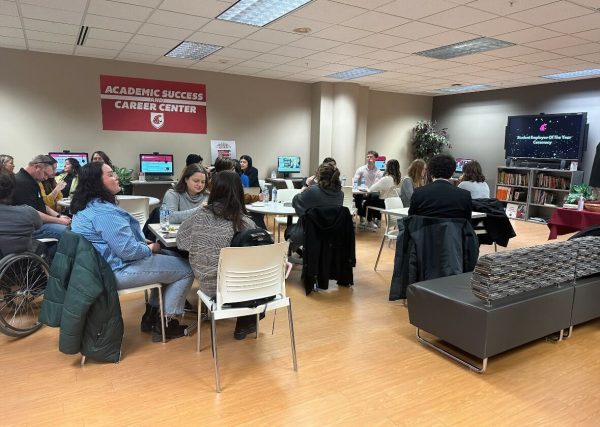Women’s attractiveness can alter perceptions at work
‘Femme fatale effect’ is rooted in sexual insecurity, can elicit feelings in others
JACQUI THOMASSON | THE DAILY EVERGREEN
Leah Sheppard, Carson College of Business management assistant professor, discusses how the business world perceives attractive females on Thursday at Todd Hall.
April 3, 2019
A WSU researcher found that a woman’s attractiveness changes how trustworthy they are seen in the workplace.
“We found that attractiveness is a liability for women, but not men when it comes to how truthful they are perceived as being,” said Leah Sheppard, assistant professor of management in the Carson College of Business.
Sheppard collaborated with Stefanie Johnson, associate professor of management at the University of Colorado, to conduct this research. They call their findings the “femme fatale effect.”
Sheppard said the reason for the femme fatale effect is situated in sexual insecurity. She said attractiveness can elicit a feeling of threat or jealousy, which leads to the perception that they are deceptive or less truthful.
She said it is possible for women affected by the femme fatale effect to overcome this bias by having behaviors that are known to build trust. This bias is a quickly made judgment, and it may go away over time, she said.
“It’s not great news because a group can be disadvantaged by this in some way,” Sheppard said.
Sheppard said she is curious about how attractiveness is relevant in the political arena, and whether it influences people to decide to learn more about candidates or count them out of the running.
Rebecca Donaway, a doctoral candidate and instructor in the Edward R. Murrow College of Communication, said it is likely that people make split decisions off a female politician’s attractiveness because stereotypes work as a mental shortcut.
“Our brains are constantly evaluating our environment based on what we already know,” Donaway said. “How you perceive someone’s attractiveness influences what you think of them.”
She said these quick judgments cannot be completely eliminated, and it is up to individuals to question their biases and challenge themselves to mitigate these observations.
Donaway contributed to a peer-reviewed article titled “What Makes a President? The Role of Gender, Emotion, Ideology and Sexism in Predicting Candidate Evaluations.” The study looked at how participants and media viewed female political candidates in the 2016 election.
Sheppard and Johnson’s paper includes six studies that were developed, implemented and evaluated over the course of seven years, she said. There were around 1,000 participants across all six studies.
They used previously rated images of women in their studies. The two highest rated images and the two lowest rated images were used to establish high attractiveness and average attractiveness, she said.
In the first four studies, the researchers established the effect of attractiveness as a disadvantage in terms of perceived truthfulness, she said.
Sheppard said they tested sexual insecurity after ruling out the lack of fit mechanism or that attractiveness can be harmful due to the view that women are misfits in seemingly masculine positions.
In the fifth study, participants were primed to feel sexually secure or generally secure, which puts them in a certain emotional state that may influence their perspective, she said. Sheppard said those who were primed into feeling sexually secure thought attractive women were as trustworthy as less attractive women.
In the final study, participants were primed to feel sexually secure or insecure then asked if a woman should be fired. Sheppard said they found that sexually secure people found attractive and less attractive women to be truthful. She said sexually insecure people saw attractive women as less truthful.
“Ultimately, you want to see that the responsibility lies with the way we view women,” Sheppard said. “It’s on us to recognize our own biases and to try to be conscious of what we’re feeling and trying to overcome that.”
Sheppard said collecting the data was easy and the analysis was straightforward. She said the biggest obstacle was having to conduct more follow up studies in order to rule out another alternative explanation.
“Most of the challenges do come with the publication process,” she said.
Sheppard and Johnson’s study, “The Femme Fatale Effect,” is published in the journal, “Sex Roles.”























